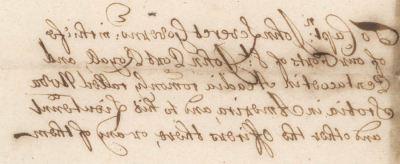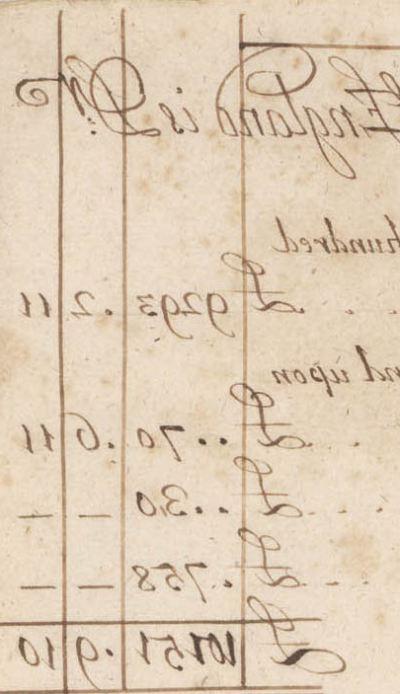John Leverett Papers
The documents presented here pertain to the military and political career of Saltonstall family ancestor, John Leverett (1616-1679), including directives from Oliver Cromwell and Charles II of Great Britain.
John Leverett came to the Massachusetts Bay Colony with his parents in 1633 from Boston, Lincolnshire Co., England. Although he worked as a merchant and became a freeman of Boston in 1640, he returned to England in 1644 to fight for Oliver Cromwell in the Parliamentary Army during the English Civil War. By 1647 he was back in Massachusetts where he married Sarah Sedgwick, the daughter of his business partner, Robert Sedgwick. He rose quickly in the colonial militia and became active in local politics, serving numerous terms in the Massachusetts General Court, and becoming a Boston selectman in 1651.
 England and the Netherlands went to war in 1651. Sensing an economic advantage to eliminating their North American competition, Leverett and Sedgwick traveled to England in 1653 to urge Oliver Cromwell to allow them to invade New Amsterdam (present day New York). Cromwell gave the two merchants a commission to go to war, sending out three or four ships and requesting an enlistment of 500 volunteers under the command of Maj. Robert Sedgwick and his son-in-law Capt. John Leverett.
England and the Netherlands went to war in 1651. Sensing an economic advantage to eliminating their North American competition, Leverett and Sedgwick traveled to England in 1653 to urge Oliver Cromwell to allow them to invade New Amsterdam (present day New York). Cromwell gave the two merchants a commission to go to war, sending out three or four ships and requesting an enlistment of 500 volunteers under the command of Maj. Robert Sedgwick and his son-in-law Capt. John Leverett.
 But by 1654, England had made peace with the Netherlands, and Cromwell ordered the force to attack the newly-positioned French in Acadia (present day Nova Scotia). Sedgwick captured the forts of St. John, Port Royal, and Penobscot, and military command was given to Leverett, who held the Acadian governorship for three years before turning over the forts to Col. Thomas Temple in 1657. He petitioned Cromwell for the money he had personally spent as commander in Acadia, and continued to petition after Charles II came to the throne in 1660.
But by 1654, England had made peace with the Netherlands, and Cromwell ordered the force to attack the newly-positioned French in Acadia (present day Nova Scotia). Sedgwick captured the forts of St. John, Port Royal, and Penobscot, and military command was given to Leverett, who held the Acadian governorship for three years before turning over the forts to Col. Thomas Temple in 1657. He petitioned Cromwell for the money he had personally spent as commander in Acadia, and continued to petition after Charles II came to the throne in 1660.
Leverett was appointed the Massachusetts Bay Colony agent or representative to England from 1655 to 1662, served as major-general in the Massachusetts militia from 1663 to 1673, and as governor of the Massachusetts Bay Colony from 1673 until his death in 1679. Leverett’s daughter Elizabeth married Elisha Cooke, Sr., the grandfather of Mary Cooke, who married Judge Richard Saltonstall in 1744.
---
![]() Instructions from Oliver Cromwell to Robert Sedgwick and John Leverett (written ...
Instructions from Oliver Cromwell to Robert Sedgwick and John Leverett (written ...
"direct yor Course either to the Mattachusetts Bay in New England or to Pequot harbor New Haven"
![]() Abstract of account of John Leverett, 1655
Abstract of account of John Leverett, 1655
![]() Instructions from Oliver Cromwell to John Leverett (written by James Nutley), ...
Instructions from Oliver Cromwell to John Leverett (written by James Nutley), ...
"Our will and pleasure therefore is, That you deliver or cause to bee delivered"
![]() Petition of John Leverett to Charles II, circa 1661
Petition of John Leverett to Charles II, circa 1661
"Wherefore your petr doth humbly pray yor Majties Gracious favour in affordeing him releife"
![]() Pass from Charles II to John Leverett, 23 April 1662
Pass from Charles II to John Leverett, 23 April 1662
"to embarke in any Port of this Our Kingdom and thence freely and quietly to passe into New England"
![]() Letter from Robert Atkyn to John Leverett, 18 March 1672
Letter from Robert Atkyn to John Leverett, 18 March 1672
"we here are full of loosenes & prophanes debauchery & what not"
![]() Register of baptisms of the children of Thomas Leverett (including John Leverett), ...
Register of baptisms of the children of Thomas Leverett (including John Leverett), ...
"John ye Son of the same babtized July 7 1616"
![]() Royal proclamation regarding the Royal African Company with signatures, 2 December ...
Royal proclamation regarding the Royal African Company with signatures, 2 December ...
"And doe Will and require you to use all possible means to cause the same to be duely and punctually observed and putt into Execuion"
![]() Letter from Charles II to John Leverett (written by Williamson), 22 August 1676 ...
Letter from Charles II to John Leverett (written by Williamson), 22 August 1676 ...
"Wee taking into our gracious consideraion the miserable condition of the petr."
